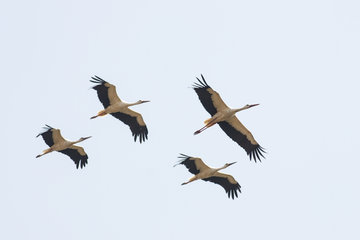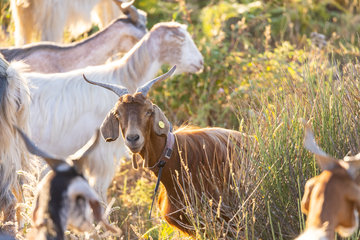“In ten years we’ll know which animals are able to predict natural disasters”
Interview with Martin Wikelski on the successful mission to transport the Icarus antennas to the International Space Station
Since 13 February, two key components of the Icarus mission have been orbiting in space. Following the on-board computer, which was carried to the International Space Station (ISS) in October 2017, another Soyuz Progress rocket has now transported the antennas of the joint German-Russian Icarus project to the ISS. Martin Wikelski, Director at the Max Planck Institute for Ornithology in Radolfzell and head of the Icarus Mission, talks about his very first countdown in life and the future of the global animal tracking system.

How does it feel to be part of a mission where so much is at stake?
Wikelski: The launch centre right in the middle of the Kazakh Steppe is in itself a very peculiar sort of place. When you stand next to one of the huge gates and the rocket rolls out of the hangar, you feel your stomach flutter. My colleagues and I put so much time and energy into the development of Icarus – all of which could go up in smoke in seconds. After all, not every launch is a success.
Now that the antenna has safely arrived at the ISS, what’s next?
First it will be stored in the Russian module of the Space Station. Then in August it will be mounted on the outside. This will mark another crucial moment. If everything goes well during the spacewalk of the Russian cosmonauts Oleg Artemyev and Sergei Prokopiev, we will have overcome the biggest hurdle yet.

2018 is a crucial year for Icarus. What are you looking forward to most in the coming months?
The first data transmission from the ISS, of course! When we receive the first test data from the Space Station and know that the system is working, at that moment I will be the happiest person on Earth.
Then we will continue running tests for two months to check that the antennas and on-board computer are working and that the data transfer is reliable. Things can then really get off the ground towards autumn of this year.
For the first time, Icarus will enable scientists to track thousands of animals on their journeys around the globe – around the clock and for months and even years on end. Around 150 research projects are already queuing up to make use of the new technology. What are the most pressing questions that Icarus can answer?
First and foremost, I would say migratory birds. Their numbers are dwindling dramatically worldwide, and in many cases, we don’t know where they are disappearing or why. If we don’t find answers soon that allow us to take countermeasures, it will be too late for many species. The same is true of massively exploited fish stocks and many marine mammals.
We also urgently need to know more about how animals spread pathogens. How does bird flu find its way to Europe? In which animals does the Ebola virus occur? To answer these questions, we want to use Icarus to track the flight paths of waterfowl in Asia and fruit bats in Africa. Both are thought to be possible carriers of the pathogens.
And finally, in ten years' time, we will know which species are able to predict natural disasters. Initial scientific data on earthquakes and volcanic eruptions suggest that some animals sense such events hours in advance. If we can demonstrate these abilities beyond a doubt, it could save the lives of hundreds of thousands of people in the future.
Thinking ahead, what will Icarus look like in ten years’ time?
First of all, the number of research projects using Icarus will increase sharply over the next few years. I would imagine that by 2028 several thousand projects will be using the system to collect scientific data. By then, hundreds of thousands of animals could be tagged with even smaller transmitters.
In ten years, Icarus will probably be stationed not only on the ISS but also on a number of satellites. The satellites would also cover regions that Icarus is unable to currently survey. More satellites would in particular allow us to open up scientifically interesting regions above the 55th parallel in Europe, Asia and North America.
As soon as Icarus is in the air, many things will change for you personally as well. What will your everyday work be like then?
Thankfully, I’ll be able to devote more time to my own research projects. Unfortunately, during the past few years my scientific work has sometimes taken a back seat to Icarus. That should change now. Starting in July I will take a science sabbatical and once again focus my attention entirely on research.
Interview: Harald Rösch













